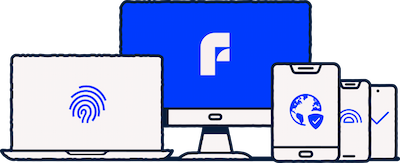The term dark web, also known as darknet, is an umbrella term for parts of the internet that are hidden and where users’ activities are anonymous and encrypted. This has its benefits but many downsides as well. This is because the dark web is often associated with illegal drug trade, the spreading of illicit online material and other criminal activities.
However, the dark web is not only full of criminals and harmful content. It also serves as a forum for anonymous communication without the fear of being tracked by websites and censorship, for instance. This allows freedom of speech in places where people’s access to the internet is limited and surveilled.
Here are some examples of web sites and pages that exist within the dark web:
Marketplaces for drugs, substances for sports doping, weapons and other illegal trade
Marketplaces for selling stolen personal information or credit cards
Sale of Ransomware-as-a-Service (RaaS) and other malware
Discussion forums where opinions are expressed anonymously
Independent news sites without political influence
Online collections of newspapers or books
Child sexual abuse material
The dark web is accessed through specific browsers, such as the Tor browser. These browsers can also be used to access any normal web pages.
Is the dark web legal?
Yes, the dark web is legal in most countries because it is part of the internet. In many ways, the dark web is just like the normal web and can be used for both good and bad. From the beginning, the idea of the dark web was to create a platform free of online tracking. However, since the dark web offers far greater privacy and anonymity than the normal
web, a lot of illegal activity takes place on the platform. Therefore, the dark web is often associated with crime, such as the sale of drugs and weapons.
Despite its dark reputation, it is very unlikely you will encounter anything illegal or dangerous on the dark web without deliberately trying to do so. This is because site URLs in the dark web are often cryptic and not meant to be found via search engines. To find illegal content, you often have to know where to go. Therefore, using the dark web is legal and safe.
Are dark web sites and search engines dangerous?
Just browsing the dark web does not pose a greater risk than using the side of the internet most users are accustomed to. However, there is a great deal of harmful material and criminal activity on the dark web. Although the dark web is not in itself a dangerous and criminal place, most people hear about it in connection with cyber crime, such as DDoS attacks and data breaches. In addition, real life horror stories about the dark web and its contents spread like wildfire.
Difference between open, deep and dark web
The terms deep web and dark web can sometimes be difficult to distinguish, especially as they are often used interchangeably. Rather than the deep and dark web being synonyms, the dark web is only a part of the much wider deep web. In addition to the deep and dark web, there is also something called the open web. Let’s look at the differences between these three separately.
Open web
Millions of web pages can be accessed with search engines such as Google and Bing. However, these web pages make up only a small slice of the web as a whole. This visible surface layer of the internet is often referred to as the open or surface web. This includes web pages that are accessible via browsers such as Chrome, Edge or Firefox and whose URLs usually have an ending like .com
or .org
. Search engines like Google index websites so they can be displayed to users to match their searches. The surface web encompasses only those pages that have been indexed by search engines. Therefore, it does not include sites where the owner has blocked indexing or content that is restricted from the public in one way or another.
Deep web
The open web can feel enormous for individual users. However, most parts of the internet are hidden from most users and search engines. This additional layer, the so-called deep web, includes significantly more pages than those visible on the open web. The open web is only the tip of the iceberg, with a significant portion of the internet remaining hidden under the surface. Meanwhile, the deep web includes, for example, web pages that require login or an intranet, various internet banks and private forums. The dark web is a small part of the deep web that cannot be accessed by standard browsers.
Tor is a popular dark web browser
Tor, short for The Onion Router, is based on a routing technique originally developed by the US government to enable encrypted communication between CIA agents in the 1990s. In the early 2000s, the Tor browser was made available for regular users and allowed them to use the internet anonymously. In addition to legal usage, nowadays Tor is widely used by cyber criminals to carry out illegal activities on the dark web.
Tor hides the user’s IP address, making it harder to track their activity online. This is why it is used by people living in countries where many parts of the internet are censored by the government or accessing certain sites could get the user in trouble. With Tor, the user’s movement between websites is encrypted, which also makes anonymous communication and commerce possible on the dark web. Tor enables the use of the dark web without fear of being tracked as easily as with a regular browser. However, even with a Tor browser, many dangers of the dark web still persist.
How to access the dark web?
Do not worry, you cannot end up on the dark web by mistake. Instead, you need a certain type of browser that can access the dark web. Tor is only one example of a browser used to access the dark web, although it is the most common and well-known one.
However, because of its multi-layered encryption, the Tor browser is slow and thus very impractical. Additionally, most users do not need to access the dark web at all. A more convenient way to protect your online privacy is to use a reliable VPN. It is much faster.
5 ways to stay safe on the internet
Criminal activities taking place on the dark web include identity theft, hacking and the distribution and sale of confidential information. It can be difficult, if not impossible, to get back your private information once it spreads on the dark web. However, this can happen on the normal side of the internet as well. To stay safe from the dangers of the internet, we list five tips to improve your personal cyber security:
Use a VPN. With a VPN, you can hide your IP address and browse privately. This makes it harder for online criminals to track your online activity. However, remember that using a VPN does not protect you from all online threats and does not make using the dark web safe.
Use an antivirus program. A VPN does not provide sufficient protection against viruses and malware that often lurk on the dark web. All your devices need comprehensive virus protection, whether using the dark web or not.
Be aware of online fraud. A mysterious email from an unknown address, or even a message that appears to be from your friend, could be sent from a stolen address sold on the dark web.
Never use the same password twice. If you are using the same password for several accounts and your login credentials are spread on the dark web, criminals can easily access multiple accounts at once. This can be prevented by using unique and strong password. A password manager makes this much easier, rather than having to remember all of your different passwords yourself.
Do not leave your devices unattended. Always keep an eye on your devices, especially when sitting in public places. Make sure not to lend your devices to strangers either.
)
)

